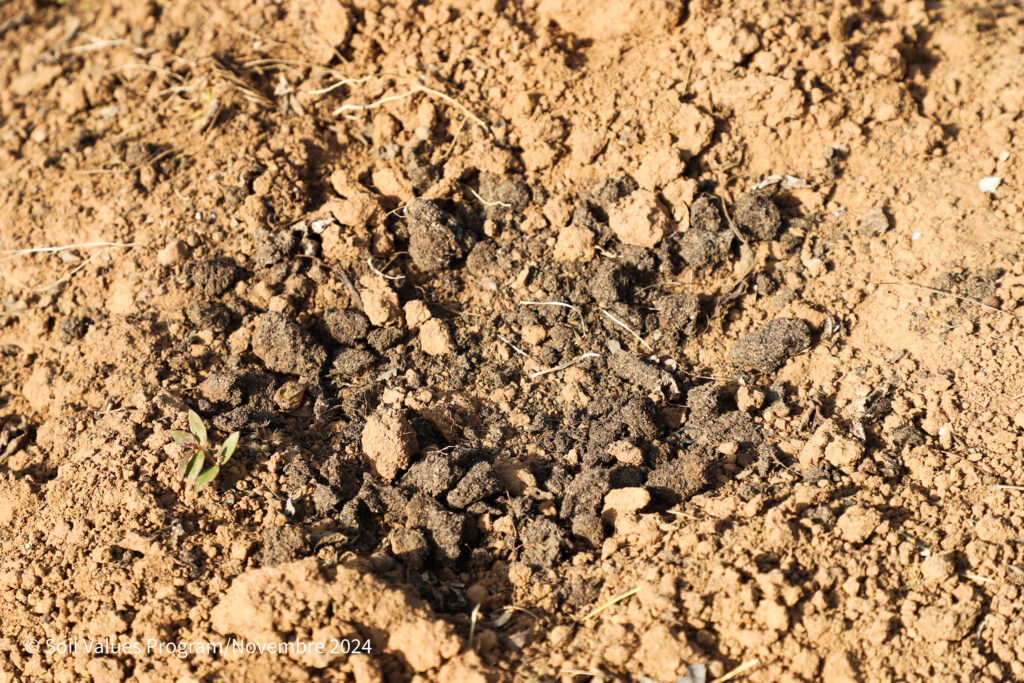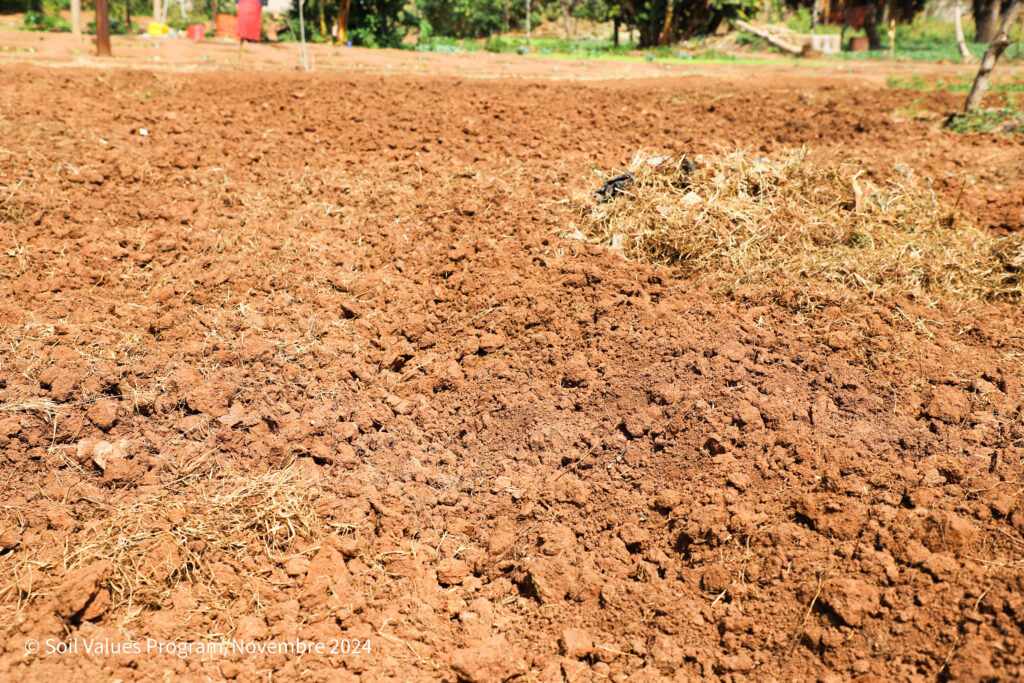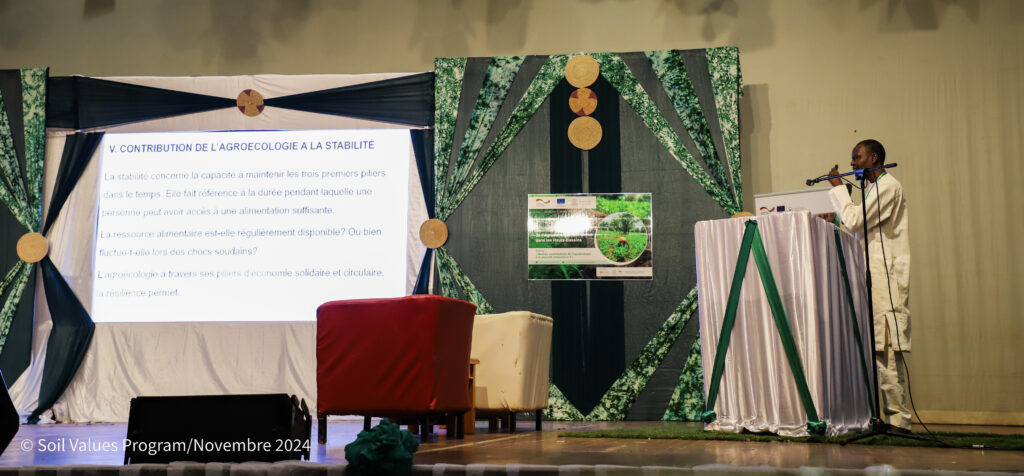
The Sahel region faces a combination of security, socio-economic, and environmental challenges, which hamper agricultural development and seriously threaten food security. Among these challenges, soil degradation stands out as a major threat to agricultural production, exacerbated by climate shifts, inappropriate farming practices, and poor funding for soil health initiatives. Soil degradation, which jeopardizes the future of agriculture in the Sahel region and exacerbates the already alarming level of food insecurity, is the major challenge the Soil Values program faces.
Alarming Degradation of Agricultural Soils
Agricultural soil degradation is a major issue. Degraded soils are the result of climate shifts, extensive farming practices, and poor use of agricultural inputs, particularly fertilizers and pesticides, as highlighted in the United Nations Convention to Combat Desertification (UNCCD) West Africa Thematic Report.4 Inadequate land management, combined with intensive farming practices and low use of organo-mineral soil inputs, depletes soil, rendering vast areas unproductive. According to Alliance Sahel1, more than 38 million people in the Sahel and West Africa are threatened by food and nutrition insecurity – a situation worsened by soil degradation.
“Unsustainable agricultural practices are damaging our land at a rate 100 times faster than the time it takes for it to regenerate naturally. Women suffer the most.”
António Guterres, UN Secretary-General
A Devastating Economic and Agricultural Impact
Soil degradation also causes considerable economic losses in West Africa, estimated at U.S. $18.9 billion, according to Boureima Sawadogo’s 2021 policy paper “The Impact of Soil Degradation on Agricultural Production and Food Security in Burkina Faso.”2 Sawadogo further indicates that in Burkina Faso, cereal yields are falling by between 5 and 20 million tons a year.

In the short term, agricultural yields in the Sahel could fall by up to 30%, with serious consequences for small-scale producers, as Jérôme Piodi of Toulouse University points out in “Desertification: a time bomb in the heart of the Sahel,”3 published in 2015. Against this backdrop of declining agricultural productivity, Bédémé Bayoulou, Field Coordinator of the Soil Values program in Burkina Faso, illustrates the reality of the situation: “In the past, a small farmer would harvest 10 carts of sorghum from a field. Today, he can barely harvest five carts from the same area.”
A Difficult Situation for Rural Women
Rural women in the Sahel are particularly affected by soil degradation, as they are often confined to impoverished land for their farming. In the absence of adequate resources and support, they struggle to restore these soils. UN Secretary-General António Guterres declares, “Unsustainable agricultural practices are damaging our land at a rate 100 times faster than the time it takes for it to regenerate naturally. Women suffer the most.” Mariam Balima-Bambara, the Gender Equality and Social Inclusion Expert for the Soil Values program in Burkina Faso, concurs: “Women, who are at the heart of agriculture and natural resource management, are deeply affected by soil degradation.”
A Strategic Response from the Soil Values Program
Commenting on sustainability challenges, Soil Values Deputy Technical Director Dr. Alimata Bandaogo says, “Let us give more value to soil! Soil is an important resource for food production and agricultural sustainability. However, the notion of sustainability is often ignored by smallholders due to their socio-economic condition, reducing soil to its short-term production function.”
Faced with such challenges of sustainability in degraded and impoverished soils, the Soil Values program offers innovative solutions for sustainable soil management and the preservation of soil fertility. The program’s ambition is to restore the fertility and health of 2 million hectares of farmland through an integrated soil fertility management (ISFM) approach.

“Healthy soils are essential for strengthening food security in the Sahel.”
Dr. Bidjokazo Fofana, Soil Values Director
To achieve its objectives, therefore, the Soil Values program relies on ISFM, the development of agricultural service offerings, private sector involvement, and active advocacy to create an enabling environment for the sustainable integration of soil health into national agricultural policies. The success of regional initiatives such as the Lomé Roundtable and the Regional Hub provide further active support for soil investments in West Africa.
Further, by linking the efforts of small-scale farmers to watershed-scale interventions, the program guarantees the sustainability and large-scale nature of its actions. Its priorities include promotion of the following:
- integration of plant and animal production as pillars of sustainable agroecological development
- agroforestry
- adoption of soil and water conservation practices.
To support these priorities, Soil Values builds the capacity of extension agents and farmers through training, provision of appropriate tools, and technical support. These initiatives are based on a participatory approach in which local communities play a leading role in the design and implementation of interventions. The Soil Values program is fully integrated into the development strategies of Sahelian countries, fostering synergies with various national, regional, and international initiatives.
The program fosters close collaboration between private and public actors, including agro-dealers, financial institutions, and political decision-makers. This synergy aims to accelerate the adoption and scaling-up of innovative practices and technologies, ensuring sustainable soil management for the benefit of future generations.
A Commitment by Agricultural Players to Coordinated Action
To ensure success and intensify the efforts toward the sustainable management of agricultural soils, the Kingdom of the Netherlands is funding the implementation of Soil Values in the amount of €100 million. Although substantial for laying the foundations for concrete action toward soil fertility, this funding remains modest given the scale of the current challenges. However, the Netherlands’ commitment is an appeal to other potential financial and technical partners to provide financial support for similar actions.

The Nairobi Declaration, made during the Africa Fertilizer and Soil Health (AFSH) Summit in May, reaffirmed the urgency of promoting policies conducive to soil preservation and regeneration. The active support of the financial institutions that committed to the Nairobi Declaration during the AFSH Summit is crucial to strengthening efforts to manage agricultural soil sustainably.
Similarly, the Regional Hub for Fertilizer and Soil Health, launched in June, plays an important role in providing technical support for the investments needed to restore soil fertility and boost agricultural productivity in the Sahel and West Africa as a whole. A collective commitment by organizations including the International Fertilizer Development Center (IFDC), the African Plant Nutrition Institute (APNI), OCP Africa, and the Mohammed VI Polytechnic University (UM6P), coordinated by Soil Values knowledge partner International Institute of Tropical Agriculture (IITA), the Hub demonstrates that coordination between local and international players is critical to effectively meet the environmental and agricultural challenges of the Sahel.
Funded by the Dutch Directorate-General for International Cooperation (DGIS), the Soil Values program is being implemented over 10 years (2024-2033), led by the International Fertilizer Development Center (IFDC), in consortium with SNV and Wageningen University and Research (WUR), as well as knowledge partners such as AGRA, the Center for International Forestry Research and World Agroforestry (CIFOR-ICRAF), the International Institute of Tropical Agriculture (IITA), ISRIC – World Soil Information, and the International Water Management Institute (IWMI).
References
1. Alliance Sahel, Sahel Alliance Members’ Priority: Resilience to Shocks Through Food Security, July 3, 2024. https://www.alliance-sahel.org/actualites/agriculture-developpement-rural-et-securite-alimentaire/priorite-securite-alimentaire/
2. Boureima Sawadogo, The Impact of Soil Degradation on Agricultural Production and Food Security in Burkina Faso, Policy Paper, 2021. https://publication.aercafricalibrary.org/bitstreams/dd459a9f-8021-4661-b19e-a9d6fab67bc4/download
3. Jérôme Piodi, Desertification: a time bomb in the heart of the Sahel, Revue Défense Nationale, 2015. https://shs.cairn.info/revue-defense-nationale-2015-8-page-28?lang=fr
4. United Nations Convention to Combat Desertification (UNCCD), Global Land Outlook, West Africa Thematic Report, Bonn, Germany, 2019. https://agrhymet.cilss.int/wp-content/uploads/2023/07/GLO-WEST-AFRICA-FRENCH_WEB_Last.pdf




